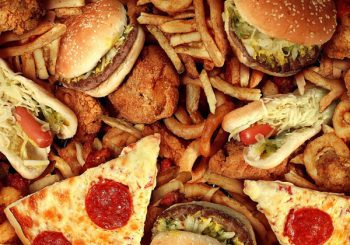Contributing writer for Wake Up World
It likely comes as no surprise that eating a diet filled with ultraprocessed foods is unhealthy. Research has demonstrated ultraprocessed foods can increase your caloric intake and weight gain.1,2
Data3 gathered from 2009 to 2010 from the National Health and Nutrition Examination Survey showed ultraprocessed foods made up 57.9% of the energy intake of Americans and sugar contributed 89.7% of the energy intake.
[pro_ad_display_adzone id=”110028″]
By 2019, a study published in the journal Nutrients4 found 71% of packaged products in the grocery store were ultraprocessed. Researchers from Northwestern Medicine estimated nearly 80% of the total calories consumed by Americans is from store-bought food and beverages.5
The researchers also compared the food supply in the U.S. against other western countries like Australia, finding packaged foods Americans were eating had higher median amounts of sugar and salt. These foods contribute to the rising level of obesity across the world.
The World Health Organization reported worldwide obesity tripled since 1975.6 The rate of overweight and obesity are rising rapidly in the U.S. as well. Data gathered from 1999 to 2000 and then again from 2017 to 2018 show the prevalence of obesity rose from 30.5% to 42.4%.7 During the same periods, the prevalence of severe obesity rose from 4.7% to 9.2%.
The Centers for Disease Control and Prevention reported that from 2017 to 2018, the prevalence of obesity was 19.3% in children and adolescents aged 2 to 19 years.8 However, as data have demonstrated and one BBC reporter illustrated, what you eat is a key factor in your health.9
BBC Reporter Eats Only Ultraprocessed Food for One Month
BBC television presenter Dr. Chris van Tulleken was interested in what would happen if he changed his diet for just one month. Tulleken, presenter of “What Are We Feeding our Kids?” was curious about how ultraprocessed foods affect our bodies. The BBC reports that in the U.K, as in the U.S., over half the energy from food in the average diet comes from ultraprocessed products.10
Over one month, 42-year-old Tulleken increased his daily intake of ultraprocessed products from 30% to 80%, mimicking how 20% of the U.K. population eats.11 At the end of four weeks, Tulleken experienced a myriad of changes to his health, including:
| Poor sleep | Heartburn |
| Anxiety | Sluggishness |
| Low libido | Unhappy feelings |
| Hemorrhoids (from constipation) | Weight gain of 7 kilograms (15.4 pounds) |
“I felt ten years older, but I didn’t realize it was all [because of] the food until I stopped eating the diet,” Tulleken told the BBC. This is telling, since the physician purposefully changed his diet and yet did not recognize feeling 10 years older in one month was associated with the food he was eating.
How much more difficult might it be to convince others that the way they are feeling is related to the chemicals they are consuming? At the rate he gained weight, he believed if he’d continued for six months, he would have gained 6 stone (84 pounds).
These were the health effects Tulleken could identify without testing. He also underwent several measurements of health biomarkers, which demonstrated significant changes from only four weeks of eating ultraprocessed foods.12
Brain scans showed that the diet had created new links in his brain from areas responsible for reward to areas that drive automatic and repetitive behavior. This is a similar response to taking classically addictive substances, such as tobacco, alcohol and drugs.
The brain changes that occurred in the short time that Tulleken had consumed high amounts of processed products were not permanent. However, it isn’t possible to make the same assumption if the diet is followed for months or years. Additionally, Tulleken points out “if it can do that in four weeks to my 42-year-old brain, what is it doing to the fragile developing brains of our children?”
You Eat More When You Eat Ultraprocessed Foods
[pro_ad_display_adzone id=”110030″]
Tulleken also discovered he consumed about 500 calories more each day than he had before he began the ultraprocessed diet. This was consistent with a study13 from the National Institutes of Health conducted by Kevin Hall, Ph.D., senior investigator at the NIH Intramural Research Program. In Hall’s research he compared two diets that were matched for macronutrients, sugar, salt and fiber content.
One diet was about 80% ultraprocessed products and the other was an unprocessed diet. The group consumed the ultraprocessed diet for two weeks and then was switched to the unprocessed diet while admitted and monitored at the NIH Clinical Center.
The participants were encouraged to eat as much or as little as they wanted. The scientists found that when the participants ate the ultraprocessed diet they consumed more carbohydrates, but not protein. During the two-week intervention, participants gained approximately 0.9 kilograms (2 pounds) while eating the ultraprocessed diet and lost the same amount eating the unprocessed diet.14
The BBC reports Hall’s team also measured hormonal biomarkers responsible for feelings of hunger and satiety.15 As you might expect, the hormone responsible for hunger (ghrelin) increased and that responsible for feeling full (leptin) decreased while participants were eating the ultraprocessed products.
These results were consistent with Tulleken’s experience, as his ghrelin level increased by 30% during the four weeks that he ate ultraprocessed products. In that month he found himself craving food more often and eating more quickly, which likely contributed to eating more food. What is classified as an ultraprocessed food may surprise you.
NOVA16 classifies food categories according to the extent and purpose of processing, rather than the nutrients found in the food. NOVA categories are recognized as a valid tool for nutrition and public health research and are used in reports from the United Nations and Pan American Health Organization.17
According to NOVA,18 ultraprocessed food and beverages have industrial formulations, typically with five or more of these types of ingredients. Below is a list that is not all inclusive but does offer insight into the types of foods that are considered ultraprocessed.19 As you can see, some are products that are touted as a healthy food choice, such as breakfast cereals, energy bars and fruit yogurt.
| Ice cream | Chocolate |
| Candy | Pastries |
| Cakes and cake mixes | Breakfast cereals |
| Cookies | Fruit yogurt |
| Fruit drinks | Energy bars |
| Cocoa drinks | Infant formulas |
| Energy drinks | Instant sauces |
| Ready-to-heat products | Powdered or packaged instant soups, noodles and desserts |
| Mass-produced bread and buns | Margarines and spreads |
Several studies have identified disease risks that are associated with consumption of ultraprocessed foods. In one study,20 researchers collected data on dietary intake from 105,159 participants. Their main outcome measurement was the risk of cardiovascular and cerebrovascular diseases.
The mean follow-up was 5.2 years, during which the researchers found intake of ultraprocessed foods was associated with a higher risk of cardiovascular disease. The results were statistically significant even after adjusting for markers of nutritional quality and after a large range of sensitivity analysis.
As Tulleken experienced, and many studies have reported, eating a diet high in ultraprocessed foods increases your risk of obesity. In turn, as the Centers for Disease Control and Prevention reports, obesity increases an adult’s risk for many serious diseases, including:21
| All-cause mortality (death) | Changes in cholesterol levels | Type 2 diabetes |
| Heart disease and high blood pressure | Sleep apnea and breathing problems | Mental illness such as depression and anxiety |
| Stroke | Gallbladder disease | Low quality of life |
| Osteoarthritis | Many types of cancers | Pain and difficulty functioning |
One of the top causes of death researchers have linked to eating ultraprocessed products is cancer. The significant role that metabolism plays on cancer cells is clear and based on the findings of Dr. Otto Warburg, a classically trained biochemist who received the Nobel Prize in physiology or medicine in 193122 for his discovery of the nature and action of cancer cell metabolism.
Smoking has been in the No. 1 spot for preventable causes of cancer for decades. However, it appears obesity is not far behind. According to Dr. Otis Brawley, professor of oncology at Johns Hopkins University and past chief medical officer of the American Cancer Society, this may happen within the next five to 10 years.23
Compared to a normal weight range, obesity increases the likelihood of cancer recurrence and is associated with a lower likelihood of survival. While the exact mechanisms behind the cancer-obesity link are not fully understood, researchers are focusing on studying24 visceral fat, as it is metabolically active and may spur cellular growth.
Metabolic Disease Raises Risk of COVID-19
As Tulleken discovered, ultraprocessed food is designed to be appealing, hyperpalatable and habit forming. This is all thanks to additives, crafty packaging and marketing and “convenience.” Unfortunately, these ultraprocessed products are filled with empty calories and devoid of vitamins, minerals, liver enzymes, micronutrients, high-quality fats and protein.
Dr. Aseem Malhotra is an honorary consultant cardiologist at Lister Hospital in Stevenage, England.25 According to an article he wrote in European Scientist, ultraprocessed foods cause:26
“… chronic metabolic disease which can affect many of ‘normal’ weight. Furthermore, sarcopenic obesity may misclassify many elderly patients to having a normal BMI on hospital admission with COVID-19 … There’s no such thing as a healthy weight, only a healthy person.
A recent commentary In Nature states that ‘patients with type 2 diabetes and metabolic syndrome might have to up 10 times greater risk of death when they contract COVID-19’ and has called for mandatory glucose and metabolic control of type 2 diabetes patients to improve outcomes.”
Since Malhotra’s assertion in early 2020, multiple studies have been published that showed comorbidities such as obesity and Type 2 diabetes increase the risk of severe COVID-19 and worse outcomes.27,28,29 This has suggested to scientists that metabolic syndrome and the consequences from it may be a “better prognostic indicator” for severe outcomes than the individual components of the syndrome.30
Your Diet Is a Key Factor in Health and Longevity
As decades of data have demonstrated, the foods you eat are a key factor and a prognostic indicator of your overall health and expected longevity. Undoubtedly, there is a serious health epidemic across the world, and it is not COVID-19. The obesity epidemic has no quick and easy answer, and much of it is linked to diet. The consequences of this health condition are far reaching and can be lethal.
It is crucial to remember that the food you eat is the foundation on which your health is built. Therefore, eating a processed food diet is a recipe for long-term disaster. If you have access to real food, it is important to take the time to learn to cook from scratch and make the most of any leftovers.
With a little bit of dedication and planning, it is also possible to grow your own produce at home, even in small spaces, including indoors. Consuming a diet of 90% real food and 10% or less processed food is achievable and may make a significant difference in weight management and overall health. For a list of guidelines to help you get started, see “Why a Calorie Is Not a Calorie.”
Sources and References:
- 1, 13, 14 Cell Metabolism, 2019;30(1)
- 2 International Journal of Obesity, 2020;44
- 3 BMJ Open, 2016;6:e009892
- 4 Nutrients, 2019;11(8)
- 5 Science Daily, July 25, 2019
- 6 World Health Organization, February 16, 2018
- 7 Centers for Disease Control and Prevention, Adult Obesity Facts
- 8 Centers for Disease Control and Prevention, Childhood Obesity Facts
- 9 BBC Food, What Happened When I Ate Ultraprocessed Food for a Month
- 10, 11, 12, 15 BBC Food
- 16, 17, 18, 19 World Nutrition, 2016; 7:1
- 20 The BMJ, 2019;365;doi.org/10.1136/bmj.l1451
- 21 Centers for Disease Control and Prevention
- 22 Nobel Prize, Otto Warburg
- 23 Washington Post, April 12, 2019
- 24 Oncotarget, 2017;8(62)
- 25 King’s Fund 2020
- 26 European Scientist, April 16, 2020
- 27 Medical News Today, September 1, 2020
- 28 Cardiology Research, 2020;11(6)
- 29 Nature Metabolism, 2021;3:289
- 30 Healio, February 17, 2021
Recommended articles by Dr. Joseph Mercola:
- Mind to Matter: How Your Brain Creates Material Reality
- Breathwork Helps Tame Stress, Benefits Mind and Body
- More Evidence Supports Benefits of Medicinal Mushrooms
- Practicing Gratitude During the Covid 19 Pandemic
- Here’s What You Should Know About Pumpkins
- Drinking Green Tea, Coffee Linked to Lower Mortality
- The Interconnectedness Between Anxiety and Inflammation
- What Can Olive Leaf Extract Do For You?
- Beets for Better Lung Efficiency
- The Little Known Sordid History of Psychiatry
About the author:
Born and raised in the inner city of Chicago, IL, Dr. Joseph Mercola is an osteopathic physician trained in both traditional and natural medicine. Board-certified in family medicine, Dr. Mercola served as the chairman of the family medicine department at St. Alexius Medical Center for five years, and in 2012 was granted fellowship status by the American College of Nutrition (ACN).
While in practice in the late 80s, Dr. Mercola realized the drugs he was prescribing to chronically ill patients were not working. By the early 90s, he began exploring the world of natural medicine, and soon changed the way he practiced medicine.
In 1997 Dr. Mercola founded Mercola.com, which is now routinely among the top 10 health sites on the internet. His passion is to transform the traditional medical paradigm in the United States. “The existing medical establishment is responsible for killing and permanently injuring millions of Americans… You want practical health solutions without the hype, and that’s what I offer.”
Visit Mercola.com for more information, or read Dr. Mercola’s full bio and resumé here.








